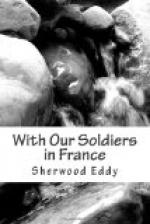Here is a letter from a young officer who fell on that fatal first day of July on the Somme.
“I never felt more confident or cheerful in my life before, and would not miss the attack for anything on earth. Every officer and man is more happy and cheerful than I have ever seen them. My idea in writing this letter is in case I am one of the ‘costs’ and get killed. I have been looking at the stars, and thinking what an immense distance they are away. What an insignificant thing the loss of, say, forty years of life is compared with them! It seems scarcely worth talking about. Well, good-bye, you darlings. Try not to worry about it, and remember that we shall meet again really quite soon. This letter is going to be posted if . . .”
A friend of the writer, a young chaplain whom he met recently at the front, went out to find his brother’s mangled body on the battlefield. The boy who fell was the son of the Bishop of Winchester, and one of the finest spirits in Oxford. Canon Scott Holland writes:
“The attack had failed. There was never any hope of its succeeding, for the machine guns of the Germans were still in full play, with their fire unimpaired. The body had to lie where it had fallen. Only, his brother could not endure to let it lie unhonoured. He found some shattered Somersets, who begged him to go no further. But he heard a voice within him bidding him risk it, and the call of the blood drove him on. Creeping out of the far end of the trench, as dusk fell, he crawled through the grass on hands and knees, in spite of shells and snipers, dropping flat on the ground as the flares shot up from the German trenches. At last he found what he sought. He could stroke with his hand the fair young head that he knew so well; he could feel for the pocket-book and prayer-book, the badge and the whistle. He could breathe a prayer of benediction and then crawl back on his perilous way in the night.”
The writer has just come from visiting a group of a dozen British and American military hospitals in one French town, with from one to four thousand patients in each, where at this moment the trains are arriving in almost a steady stream, bearing the wounded from the front in the great drive in Flanders. He has stood by the operating tables and passed down those long, unending rows of cots. Some of these tragic hospital wards are filled with men, every one of whom is blinded for life by poison gas or shrapnel. They, like all the other wounded, are brave and cheerful, but it will take great courage to maintain this cheer, groping a long lifetime in the dark. One man counted 151 trains of twenty cars each, or 3,000 carriages, filled with German wounded passing back in a steady stream through Belgium. Behind all the active fronts these train loads of wounded are daily bearing their burden of suffering humanity. The cities and towns of Europe are filled with limping or crippled or wounded men today.




